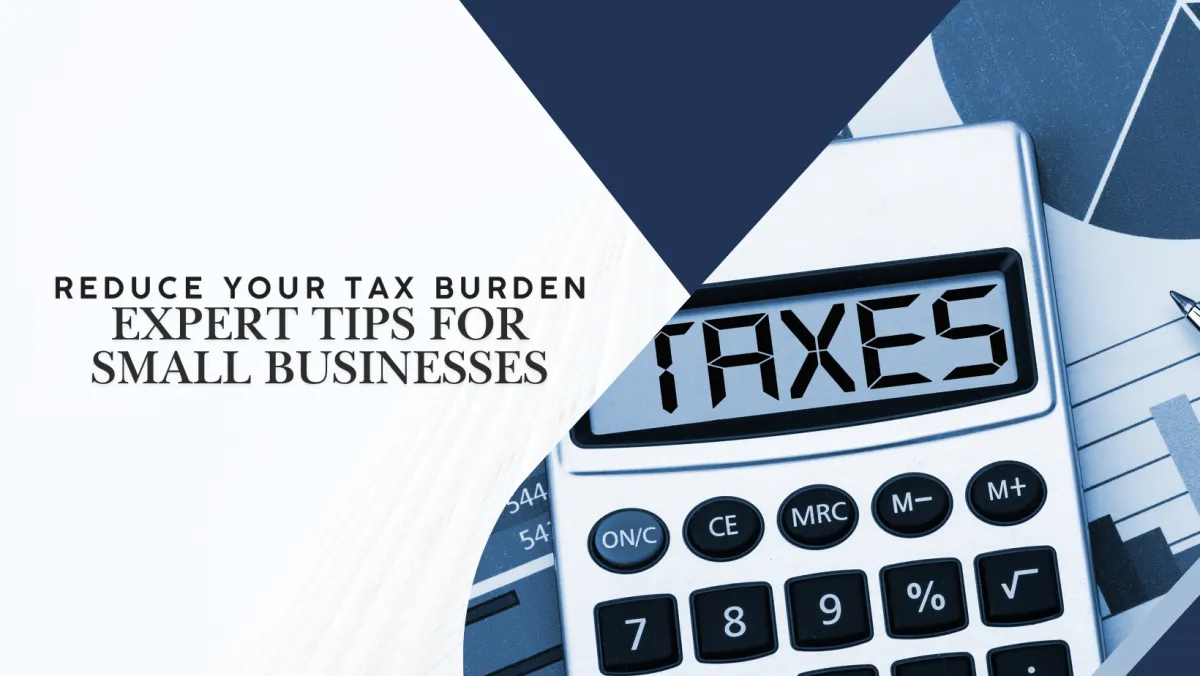
Reduce Your Tax Burden: Expert Tips for Small Businesses
Reduce Your Tax Burden: Expert Tips for Small Businesses
Personal taxes can feel complex, but business taxes often take that complexity to another level. For small business owners, tax season can be especially challenging. After all, the financial health of your company depends heavily on your ability to reduce tax liability while complying with IRS regulations.
Though taxes might not be the most exciting aspect of running a business, they are an essential one. Getting a firm handle on your business taxes can boost your income, enhance your financial stability, and help you avoid unnecessary legal complications.
Here are some tried-and-true tax tips every small business owner should know to stay ahead.
1. Keep Your Tax and Financial Documents for at Least Seven Years
Maintaining proper records is one of the most crucial steps in managing your business taxes. The IRS requires supporting documentation for any claims made during tax filing. These documents might include receipts, invoices, bank statements, and contracts.
Keeping your records organized not only helps in case of an audit but also ensures better financial management throughout the year. Reconstructing missing records at a later date is often time-consuming and stressful, so it’s far better to develop a habit of saving everything now.
Tip: Invest in accounting software or cloud-based storage solutions to keep your financial records secure, organized, and easily accessible.
2. Know Your Deadlines
While April 15th is the most commonly recognized tax deadline, it’s not the only one. Different business structures have different filing requirements:
C-Corporations: These entities must file their taxes within 10 weeks after the end of their fiscal year, which is typically December 31st. This means their tax deadline usually falls on March 15th.
Sole Proprietors, Partnerships, and Other Entities: These businesses generally follow the individual tax deadline of April 15th.
Missing a tax deadline can result in costly penalties and interest charges. Keep track of due dates by setting calendar reminders or working with a tax professional who can help you stay on schedule.
3. Understand Your Loans
The IRS generally doesn’t classify most business loans as income, which can be a relief for small business owners. However, the interest you pay on those loans is often tax-deductible.
To maximize this benefit, maintain detailed records of how the loan funds are used. For instance, whether the money was spent on equipment, inventory, or operational expenses, having documentation will support your deduction claims and help avoid issues during tax filing.
4. Familiarize Yourself with the Different Types of Audits
The word "audit" often sends a chill down the spine of any business owner. However, not all audits are created equal. Here’s what you need to know:
Office Audit: A relatively simple audit where you’re asked to visit the local IRS office to clarify or resolve discrepancies.
Correspondence Audit: This involves sending specific documents to the IRS via mail or fax to address an issue.
Field Audit: A more thorough audit conducted at your place of business, where the IRS examines your records in detail.
Criminal Investigation Audit: This is the most serious type of audit and involves suspicions of tax fraud or evasion. If you’re faced with this, consult an attorney immediately.
Understanding these distinctions can help you prepare effectively if you’re ever audited and reduce unnecessary anxiety.
5. Pay Your Quarterly Taxes on Time
If you’re self-employed or run a small business, you’re likely required to make quarterly estimated tax payments. This is a common area of oversight for many entrepreneurs.
Failure to pay quarterly taxes can lead to penalties and a hefty year-end tax bill that’s difficult to handle in one payment. To avoid this, calculate your estimated taxes accurately and set aside a portion of your income every month to cover these payments.
Tip: Create a separate bank account specifically for quarterly taxes to ensure you’re not tempted to dip into those funds for other expenses.
6. Prepare Your Taxes Early
Procrastinating until April 14th isn’t just stressful—it can also lead to errors and missed opportunities to reduce your tax burden. Preparing your taxes early gives you the time needed to:
Gather all required documentation.
Identify potential deductions and credits.
Consult with a tax professional if needed.
If you’re expecting a refund, filing early also ensures you get your money back faster. Additionally, filing early can sometimes help you avoid the heightened risk of audits associated with last-minute filings.
7. Seek Professional Help When Needed
Depending on the complexity of your business’s finances, hiring a tax professional can be a wise investment. Tax experts are well-versed in current regulations and can help you identify deductions or credits you might otherwise miss.
While there’s a cost associated with professional help, the potential savings on your tax bill—and the reduced risk of errors or audits—often outweigh the expense.
8. Avoid Misusing Payroll Taxes
Using payroll taxes withheld from employees for business expenses is a common but serious mistake. The IRS expects these taxes to be deposited promptly and accurately. Misusing these funds can lead to severe penalties and legal consequences.
Pro Tip: Automate your payroll tax deposits to avoid forgetting or mismanaging these critical payments.
Final Thoughts
Taxes are an inevitable part of running a successful business, but with the right approach, you can minimize the burden and keep more of your hard-earned profits. By keeping organized records, understanding key deadlines, and seeking professional advice when needed, you can navigate tax season with confidence and efficiency.
If you’re unsure about any aspect of your business taxes, don’t hesitate to reach out to a tax professional. A little effort today can save you from significant stress and financial strain in the future.
To learn more, contact us here.
Kenner French, is a former small business contributor at Forbes.com, author of three books, an executive at AI-focused VastSolutionsGroup.com, a keynote speaker, and a Dave Matthews Band fan!
